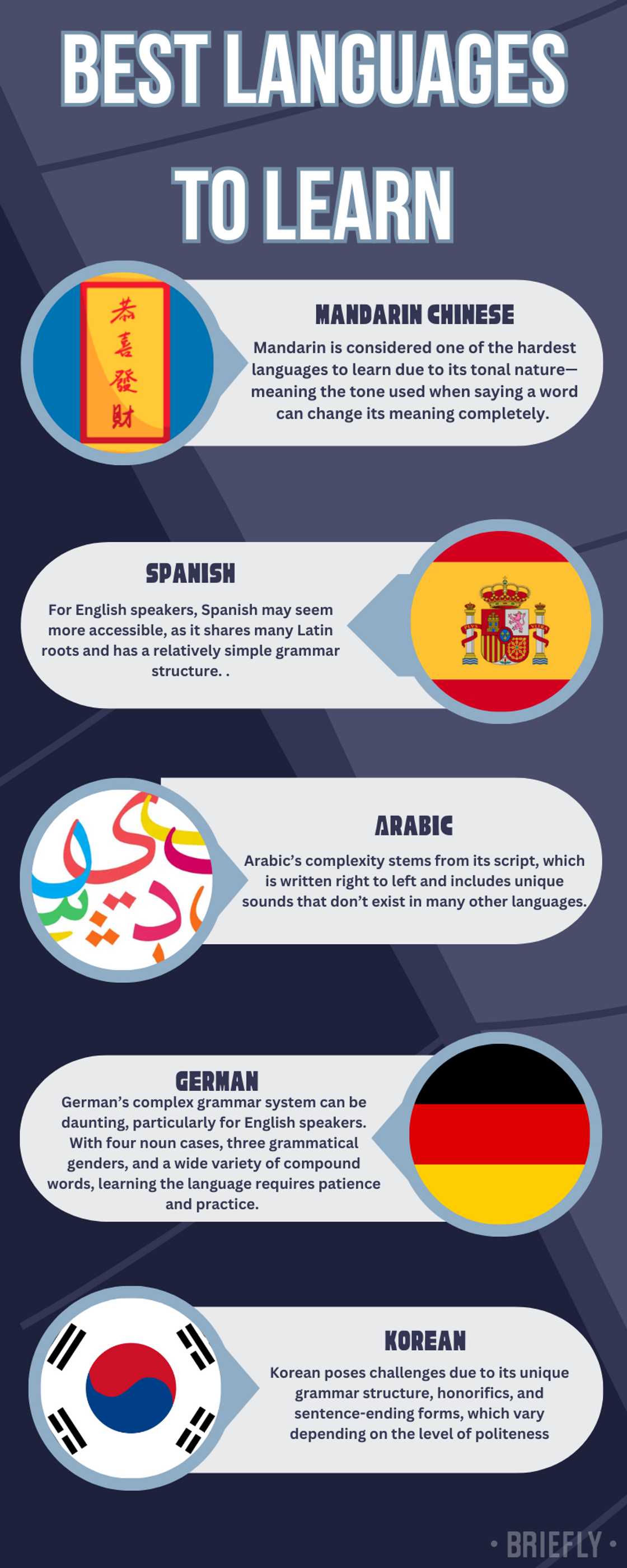What are the top 20 best languages to learn for academics, career, travel, more?
Learning a new language happens to be on most people's bucket lists. However, the problem is that most people lack knowledge of the benefits such a skill can offer in return. Check out the best languages to learn in 2024 and why they should be on your bucket list.

Source: UGC
TABLE OF CONTENTS
- Summary of the top 20 best languages to learn today
- What are the top 20 best languages to learn?
- What is the most useful language to learn after English?
- Which language is most useful to learn?
- Which language is best to learn for a career?
- What are the top 4 languages to learn?
- What is the 1 easiest language to learn?
- What language should you learn?
- What's the hardest language?
- Which language has more letters?
- Is it OK to learn 2 languages at once?
- Which is the easiest language to learn?
- What 2 languages are the most similar?
The list of the best languages to learn was selected based on the language's relevance across various domains including academics, career prospects, and travel opportunities. Several key criteria such as global influence, economic impact, cultural significance, and practical utility were also considered. The list is arranged in no particular order.
Summary of the top 20 best languages to learn today
No | Language | Native Speakers (aprox) | Regions Spoken | Significance/Benefits |
1 | Mandarin Chinese | 1.1 billion | China, Taiwan, Singapore | Critical for business and diplomacy in Asia |
2 | Spanish | 580 million | Spain, Latin America, USA | Widely spoken; important for travel and global business |
3 | Arabic | 310 million | Middle East, North Africa | Key for international relations and Islamic studies |
4 | German | 90 million | Germany, Austria, Switzerland | Valuable in Europe; strong in science and engineering |
5 | Korean | 77 million | South Korea, North Korea | Increasingly important in tech and entertainment |
6 | English | 1.5 billion | Global (varies by region) | International lingua franca; essential for global business |
7 | Marathi | 83 million | India | Important in Indian literature and media |
8 | Russian | 154 million | Russia, Eastern Europe | Significant in politics, science, and literature |
9 | Japanese | 125 million | Japan | Key for technology and Japanese culture |
10 | Portuguese | 220 million | Portugal, Brazil, Africa | Important in Brazil and parts of Africa |
11 | Hindi | 600 million | India, Nepal | Major language in India; significant in Bollywood |
12 | Swahili | 75 million | East Africa | Widely used in East Africa; useful for regional trade |
13 | Italian | 64 million | Italy, Switzerland | Valuable in art, fashion, and cuisine |
14 | Finnish | 5 million | Finland | Unique language; important for Nordic studies |
15 | Dutch | 23 million | Netherlands, Belgium | Useful in European trade and business |
16 | Indonesian | 45 million | Indonesia | Key for business in Southeast Asia |
17 | Nigerian Pidgin | 20 million | Nigeria, West Africa | Widely spoken in Nigeria; important for cultural studies |
18 | Bengali | 230 million | Bangladesh, India | Significant in literature and culture |
19 | Urdu | 230 million | Pakistan, India | Key for South Asian culture and history |
20 | French | 300 million | France, Africa, Canada | Widely spoken; important in diplomacy and international organizations |
What are the top 20 best languages to learn?
Learning a new language is always an excellent idea, whether it is for fun, work, or interest in a particular culture. But, what are the criteria to use to determine the language to study? Do you look for the most important languages to learn, or do you follow your heart?
It turns out that there are more advantages to learning specific languages in 2024. Below are the top foreign languages to learn in 2024 and their benefits:
1. Mandarin Chinese
Thanks to its popularity in the business world, Mandarin Chinese is one of the top foreign languages to learn in 2024. Roughly, 800 million in the world today have been estimated to speak this language.
American media magnate Mark Zuckerberg is one of the global investors who has surprised the world with his Mandarin skills. The most famous form of spoken Mandarin Chinese is Putonghua, meaning "common speech." Learning it is considered one of the best moves you can make today because it is common in trading nations like China.
- Difficulty to learn: Mandarin is considered one of the hardest languages to learn due to its tonal nature—meaning the tone used when saying a word can change its meaning completely.
- Additionally, Mandarin uses thousands of unique characters instead of an alphabet, requiring extensive memorization. Understanding cultural context is also crucial to mastering the language.
2. Spanish
Spanish is considered a vital language to learn in 2024, and for good reasons. It is the official language of more than twenty countries. It is also the second unofficial language for most countries, including American countries, such as Costa Rica, Argentina, Peru, Paraguay, Colombia, Cuba, and the Dominican Republic.
Secondly, the World Economic Forum has ranked it the fourth most powerful language globally. The criteria used to assess its power include the language's ability to participate in an economy, engage in dialogue, be used in the media, international relations, and travel.
The language is going global, given that the film industry has even started airing Spanish-English shows on global networks like Netflix. One of such shows is the world's favorite show, Money Heist.
There are tons of Spanish materials online to guide you in learning the language basics. Similarly, most countries worldwide are offering Spanish courses.
- Difficulty to learn: For English speakers, Spanish may seem more accessible, as it shares many Latin roots and has a relatively simple grammar structure. However, mastering verb conjugations, including the subjunctive tense, and understanding regional variations in dialects can pose challenges.
3. Arabic
Arabic is one of the best languages to learn for business in the Middle East and Africa. It has been ranked the fifth most powerful language globally by the World Economic Forum. Due to the growing economies in these continents, business experts suggest investing in learning Arabic.
- Difficulty to learn: Arabic’s complexity stems from its script, which is written right to left and includes unique sounds that don’t exist in many other languages.
4. German
German is officially spoken in six countries, including Germany, Austria, Switzerland, Belgium, Luxembourg, and Liechtenstein. It is one of the best languages to learn in 2024 because Germany is the largest economy in Europe.
It means that German is vital for international diplomacy and business. More so, communicating in German can enhance your relations, networking skills, and job opportunities with foreign countries.
- Difficulty to learn: German’s complex grammar system can be daunting, particularly for English speakers. With four noun cases, three grammatical genders, and a wide variety of compound words, learning the language requires patience and practice.
5. Korean
Korean is another language that has propelled to greater heights, especially in the film industry. On top of that, Korean music is taking over the world fast, with popular K-Pop boy groups emerging, such as BTS, EXO, NCT, and Wanna One.
Korean has also become a language of interest to learn because its culture and food are slowly finding their way to numerous countries, like the suburb of New Malden in London. So, it is an excellent language to learn if you are interested in Korean food and lifestyle. You will find several sites offering Korean courses online.
- Difficulty to learn: Korean poses challenges due to its unique grammar structure, honorifics, and sentence-ending forms, which vary depending on the level of politeness.

Source: Getty Images
6. English
In today's increasingly interconnected world, English is a significant language to learn to break barriers and enhance global understanding. Over 1.5 billion people use English at work, school, or travel. It is also the official language in 60+ countries, including the UK, Canada, Australia, United States, and New Zealand.
English has permeated corporate culture and is a staple in media, business, entertainment, and education. Its reach is extremely massive, and it is hardly surprising that the language is ranked first on the World Economic Forum's list of the world's most powerful languages.
- Difficulty to learn: English has extensive grammar rules, many vocabulary, and endless exceptions. However, there are many resources for devoted learners to find the easiest language to learn.
7. Marathi
Marathi is ranked the third most common language in India. Its over 100 million speakers, however, predominantly inhabit the state of Maharashtra. Marathi has existed in its current form for over 13 centuries, and experts classify it as one of the oldest languages in the world.
What sets the language apart is its unusually long words. These words can be quite a mouthful, and the average learner might find it challenging to master.
- Difficulty to learn: Marathi has complex script and grammar. However, native Indo-Aryan speakers could have some foundational advantages.
8. Russian
Besides being the official language in Russia, the language boasts a rich history and culture. Russia's vast size, emerging economy, top oil production, and key role in world politics make it an attractive destination.
he country's permanent membership with the U.N. Security Council and key roles in international commerce and organizations like the IMF and World Bank make Russian a critical language.
Russian, spoken across Russia and Central and Eastern Europe, is the eighth most common language and ranked sixth most powerful by the World Economic Forum.
After English, online is the second most used language for website content and sales leads in Europe. This global significance makes it one of the best languages to learn for business.
- Difficulty to learn: Russian has one of the most complex grammar rules, making it a challenging language.
9. Japanese
Japanese is ranked eighth's most powerful language on the World Economic Forum's Power Language Index. The country is a tourism heavyweight, tech giant, and an economic powerhouse with a GDP that ranks third globally.
Therefore, learning Japanese gives you an edge over notable multinational companies such as Honda, Sony, Toyota, and Nintendo. While Japanese is officially spoken only in Japan, many compelling reasons exist to learn the language.
For instance, the country's unique culture makes it a top tourist hub, and learning the language demonstrates respect for local culture. Japanese is also the third most used language online, which is fundamental in facilitating virtual business.
- Difficulty to learn: Japanese is relatively difficult due to its complex grammar, unrelated linguistics, and three distinct writing systems.
10. Portuguese
Portuguese is one of the most widely spoken languages in the world; hence, it is one of the best languages to learn for the future. It is the official language in many countries, including Africa, Europe, South America, and Asia.
The World Economic Forum also ranks it as the ninth most powerful language and the fastest-growing in Europe after English, according to UNESCO. In Brazil, for example, over 210 million people speak Portuguese.
Many multinational tourism, energy, finance, and technology corporations are setting up shop in Brazil. Moreover, the country's close relationship with BRIC nations, especially India, has fueled the demand for Portuguese.
- Difficulty to learn: Portuguese is closely related to Spanish, meaning Spanish speakers will grasp it fairly quickly.

Source: Getty Images
11. Hindi
Alongside English, Hindi is officially spoken in India and other countries such as Sri Lanka, Fiji, Mauritius, and Nepal. India is a rapidly growing economy renowned for its tech industry and commerce. That and its expanding middle class make learning the Hindi language worthwhile.
Over 610 million people, both locally and abroad, speak Hindi. Proficiency in the language can be invaluable if you are looking for the best language to learn for jobs in India's diverse economy. Mastering the language also offers a gateway into the country's rich history and welcoming culture.
- Difficulty to learn: Hindi has a reasonably complex script. However, its inherent similarities with the Indo-European language family make it easier to master.
12. Swahili
Swahili is a widely spoken language in Eastern Africa. Thanks to increasing multilingual societies, it is a native African language with English, Hindi, Persian, and Portuguese influences. Alongside English, Swahili is the official language in Kenya and Tanzania and is spoken in neighbouring countries.
With over 200 million native speakers, Swahili's influence is massive. Most East African countries are top tourism destinations for safaris, history, and game enthusiasts. Therefore, learning the language unlocks career prospects in these sectors and offers a lifetime experience of unique culture and natural scenery.
- Difficulty to learn: Swahili has Hindi, Arabic, Bantu, and English influences, so speakers from these groups will find it reasonably easy to understand.
13. Italian
Italian overlaps more with English and is probably one of the best languages to learn for English speakers looking to expand their horizons. According to the U.S. Department of Education, Italian is the fastest-growing language, ahead of German and Spanish, regarding enrollment rates in colleges and high schools.
Italy is a leading European economy, with a GDP ranked third-largest in the union. It boasts a multifaceted manufacturing economy with numerous career prospects. Moreover, as a top travel destination, learning Italian will positively impact your stay and offer a culturally immersive experience.
- Difficulty to learn: Italian has Latin roots as familiar as English and Spanish, so these speakers will find learning it less challenging.
14. Finnish
Finish language online courses are in demand, and for a good reason. Finland is becoming a top European destination to live and study, as is the demand for the Finnish language. The country is a mainstay in the top five happiest countries in the world.
Finland's living standards, equality, and excellence in education are hard to go unnoticed. That is a testament to a functional economy and governance that prioritizes the welfare of the citizenry. Besides, it's a tourist hub with pristine conditions for foreign workers.
- Difficulty to learn: Finnish has complex grammar and a unique case system, so experts generally regard it as challenging.
15. Dutch
Dutch is another easiest language to learn, especially if you have a basic understanding of English. Holland is a top commercial and transportation centre in Europe. The country is home strategically located to facilitate trade and welcomes its fair share of foreign workers.
Thanks to E.U.'s free border movement, workers interested in working and building a career in the Netherlands could have a competitive edge in learning Dutch. Amsterdam is a commercial hub and an ideal location to build a fulfilling career.
- Difficulty to learn: Learning Dutch is easier for English speakers, particularly because the language shares the same phonetic structure and vocabulary.

Source: Getty Images
16. Indonesian
The British Council lists Indonesian among the best languages to learn for the future. An estimated 199 million speakers, both native and non-native, use the language for communication.
Indonesia is renowned as a top tourism destination and one of the most hospitable places on earth. Therefore, mastering the language will unlock job opportunities and the chance to study at some of the best universities in Southeast Asia.
- Difficulty to learn: Indonesian syntax and grammar are easy, so English speakers will find it straightforward to learn the language.
17. Nigerian Pidgin
Nigeria is the fastest-growing economy in West Africa. It is a top oil producer, a tourist hub, and an open-market economy for commerce. Although its population boom falls slightly below that of the U.S., the most widely spoken language is Pidgin, boasting over 120 million speakers.
Also known as Naija, Pidgin has massive Creole and English influences, thanks to British colonial history. The beauty of Pidgin is its expressiveness and the speaker's ability to convey complex ideas in easy-to-understand forms.
It may not be the easiest language to learn, but having a basic grasp will offer immersive experiences of Nigerian culture.
- Difficulty to learn: Pidgin is influenced by English, Creole, Ibo, and Yoruba. While it can be relatively easy to master, regional language variations may be challenging.
18. Bengali
Bengali is Bangladesh's official language but is spoken in some areas of India and Burma. Like Hindi, Bengali belongs to Indo-Aryan, a branch of the Indo-European language cluster. The language isn't easy to master, primarily due to its intricate vowel and left-to-right writing systems.
Bengali has a distinctive musical quality that promotes poetry in Bangladeshi culture. The language also boasts over 270 million speakers; despite its difficulty, there are perhaps 270 million reasons why you should learn it.
- Difficulty to learn: Bengali has a distinct script and complex vocabulary, but its easy phonetic structure can offset its difficulty.
19. Urdu
Urdu is the official language in Pakistan alongside Arabic, and is also spoken in some areas of India. Urdu's spoken part is closely intelligible with Hindi, and speakers from both languages can easily understand each other.
Urdu has over 230 million speakers, but its phonetic qualities set it apart from Hindi. Despite India's political tensions with Pakistan, Urdu remains the most critical language, serving as a bridge between the two countries.
- Difficulty to learn: Urdu is closely related to Hindi, so Hindi speakers will find it easy to understand.
20. French
French may not be one of the best languages to learn in the world if you aren't the romantic type. However, it is the second-most widely spoken language in Europe and emerging markets, which makes it ideal for broadening your network for personal, business, or career opportunities.
French is the official language in 29 countries, including Belgium, Senegal, France, and Canada. France's colonial legacy contributed to the language's widespread reach. Interestingly, more people speak French outside France than within it.
Forbes Magazine also estimates that by 2050, there will be 750 million French speakers worldwide. That is because the language is slowly becoming dominant in fashion, visual arts, and global tourism.
- Difficulty to learn: French is easy for English speakers to learn as the language shares the same standardized alphabet and a host of other vocabulary.

Source: Getty Images
What is the most useful language to learn after English?
With over 590 million speakers, Spanish is arguably the most useful language a speaker should learn after English. The language has a massive reach in Africa, the United States, Europe, and beyond. It is a valuable asset in cultural exchange, commerce, and tourism.
Which language is most useful to learn?
English is perhaps the most useful language to learn. That is based on the World Economic Forum's Power Language Index (PLI), which factors in 20 indicators that measure a language's influence.
Which language is best to learn for a career?
The best language to learn for a career depends on your professional interests. For example, if you're a non-native in Tanzania looking to become a United Nations interpreter, you will be better served by learning Swahili.
What are the top 4 languages to learn?
According to the Power Language Index by the World Economic Forum, the top four languages you should consider learning include English, Mandarin, French, and Spanish. However, the choice can vary based on your career prospects and personal preferences.
What is the 1 easiest language to learn?
The easiest language to learn will vary depending on one's first language. For instance, Dutch has consistently been fronted as the easiest language for English speakers to learn.
What language should you learn?
It comes down to your interest and other factors like work requirements or life goals. If you are looking for career opportunities, try widely-used languages like Python (tech) or Mandarin (business). For travel, Spanish or French is helpful. Choose based on your interests and future plans!
What's the hardest language?
The hardest language depends on your native tongue. For English speakers, languages like Mandarin, Arabic, and Japanese are often considered the most difficult due to complex writing systems, grammar, and pronunciation.
Which language has more letters?
The Khmer language, spoken in Cambodia, has the largest alphabet, with 74 letters, including 33 consonants, 23 vowels, and several diacritics.
Is it OK to learn 2 languages at once?
Yes, it's possible to learn two languages at once, but it can be challenging. To succeed, choose languages that are different from each other to avoid confusion, set clear goals, and stay consistent in your practice. Time management and focus are key!
Which is the easiest language to learn?
For English speakers, languages like Spanish, Italian, and French are often considered easier due to similar vocabulary and relatively simple grammar rules. These languages share many roots with English, making them more accessible.
What 2 languages are the most similar?
Linguists identify the similarity by determining if they belong to the same language family. The most mutually intelligible pair, as per most sources, is Portuguese and Spanish.
Learning a new language not only enhances cognitive abilities and cultural appreciation but also opens doors to new opportunities in education, business, and global networking. Ultimately, the best languages to learn are the ones that aligns with your ambitions and passions, making it a valuable asset in both personal and professional pursuits.

Source: Original
Briefly.co.za shared a post about the best self-help books for women that can help turn doubt into confidence. Self-help books are known for giving people the momentum to keep moving forward. These books inspire you to boost your confidence, embrace vulnerability, and discover your true purpose.
The best self-help books for women are not just reads but game-changers. These books will help you conquer fears, embrace your strengths, and step into your most empowered self.
Source: Briefly News

Peter Kinuthia Peter Kinuthia is a 2018 graduate of Kenyatta University with a Bachelor's degree in Health Services Management. With over five years of copy-writing experience about media, lifestyle, and health affairs, Peter has cemented a solid career in copy-writing/journalism. He previously worked with Ace My Homework before joining the Briefly team in 2017. With over 5 years of experience in Briefly, Peter has become a remarkable wordsmith. (Email: petekinuthia9@gmail.com)

Jackline Wangare (Lifestyle writer) Jackline Simwa is a content writer at Briefly.co.za, where she has worked since mid-2021. She tackles diverse topics, including finance, entertainment, sports, and lifestyle. Previously, she worked at The Campanile by Kenyatta University. She has more than five years in writing. Jackline graduated with a Bachelor’s degree in Economics (2019) and a Diploma in Marketing (2015) from Kenyatta University. In 2023, Jackline finished the AFP course on Digital Investigation Techniques and Google News Initiative course in 2024. Email: simwajackie2022@gmail.com.
















